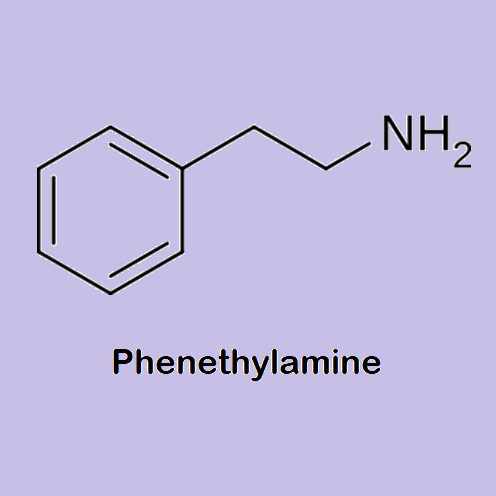Monographs licensed from Therapeutic Research Center, LLC
Scientific names: 2-Phenylethanamine
Alternate names: 1-Amino-2-phenylethane, 2-Phenethylamine, 2-Phenylethylamine, Benzeneethanamine, Beta-phenethylamine, Beta-phenylethylamine, PEA, Phenethylamine HCl, Phenethylamine Hydrochloride, Phenylethylamine, Phenylethylamine Hydrochloride, R-B-Phenylethylamine HCl, R-Beta-Methylphenylethylamine
Scientific names: 2-Phenylethanamine
Alternate names: 1-Amino-2-phenylethane, 2-Phenethylamine, 2-Phenylethylamine, Benzeneethanamine, Beta-phenethylamine, Beta-phenylethylamine, PEA, Phenethylamine HCl, Phenethylamine Hydrochloride, Phenylethylamine, Phenylethylamine Hydrochloride, R-B-Phenylethylamine HCl, R-Beta-Methylphenylethylamine
Phenethylamine (PEA) is a chemical with stimulant effects. It's found naturally in plants, bacteria, fungi, and animals. It can also be made in a lab.
Phenethylamine stimulates the body to make certain chemicals that play a role in brain chemistry. It is similar to the drug amphetamine and may cause similar side effects.
People use phenethylamine for athletic performance, depression, obesity, and other conditions, but there is no good scientific evidence to support these uses.
Don't confuse phenethylamine with Acacia rigidula. This is a shrub that contains phenethylamine. Also don't confuse it with another chemical called palmitoylethanolamide, which might also be called PEA. These are not the same.
When taken by mouth: Phenethylamine is possibly unsafe. Phenethylamine is similar to the drug amphetamine, and may cause similar side effects, such as rapid heart rate, anxiety, or agitation.
Special Precautions & Warnings:
Pregnancy and breast-feeding: There isn't enough reliable information to know if phenethylamine is safe to use when pregnant or breast-feeding. Stay on the safe side and avoid use.
Bipolar disorder: Phenethylamine might cause people with bipolar disorder to convert from depression to mania.
Schizophrenia: Phenethylamine might worsen symptoms of schizophrenia, including hallucinations or delusions.
Surgery: Phenethylamine might affect the central nervous system. This could interfere with surgery. Stop taking phenethylamine at least 2 weeks before a scheduled surgery.
There is interest in using phenethylamine for a number of purposes, but there isn't enough reliable information to say whether it might be helpful.
There isn't enough reliable information to know what an appropriate dose of phenethylamine might be. Keep in mind that natural products are not always necessarily safe and dosages can be important. Be sure to follow relevant directions on product labels and consult a healthcare professional before using.
Interactions with pharmaceuticals
Medications for depression (MAOIs)
Interaction Rating=Moderate Be cautious with this combination.
Phenethylamine increases a chemical in the brain called serotonin. Some medications used for depression also increase serotonin. Taking phenethylamine along with these medications used for depression might increase serotonin too much. This can cause serious side effects including severe headache, heart problems, shivering, confusion, and anxiety.
Some common MAOIs include phenelzine (Nardil), selegiline (Zelapar), and tranylcypromine (Parnate).
Serotonergic drugs
Interaction Rating=Moderate Be cautious with this combination.
Phenethylamine might increase a brain chemical called serotonin. Some medications also have this effect. Taking phenethylamine along with these medications might increase serotonin too much. This might cause serious side effects including heart problems, seizures, and vomiting.
Interactions with herbs & supplements
Herbs and supplements with serotonergic properties: Phenethylamine increases a brain chemical called serotonin. Taking it along with other supplements that have this effect might cause serious side effects, including heart problems, seizures, and vomiting. Examples of supplements with this effect include 5-HTP, black seed, L-tryptophan, SAMe, and St. John's wort.
There are no known interactions with foods.
vital.ly has licensed monographs from TRC Healthcare.
This monograph was last reviewed on 07/12/2023 11:00:00 and last updated on 02/09/2020 22:28:23. Monographs are reviewed and/or updated multiple times per month and at least once per year.
Natural Medicines disclaims any responsibility related to medical consequences of using any medical product. Effort is made to ensure that the information contained in this monograph is accurate at the time it was published. Consumers and medical professionals who consult this monograph are cautioned that any medical or product related decision is the sole responsibility of the consumer and/or the health care professional. A legal License Agreement sets limitations on downloading, storing, or printing content from this Database. No reproduction of this monograph or any content from this Database is permitted without written permission from the publisher. It is unlawful to download, store, or distribute content from this site.
Natural Medicines rates safety based on scientific evidence according to the following scale: Likely Safe, Possibly Safe, Possibly Unsafe, Likely Unsafe, Unsafe, and Insufficient Evidence to Rate. For more information about Natural Medicines’ Safety Rating System,
click here.
The Natural Medicines Effectiveness Ratings are assigned for specific indications. A product might be rated "Possibly Effective" for one condition, but be rated "Likely Ineffective" for another condition, depending on the evidence. For more info
click here.





